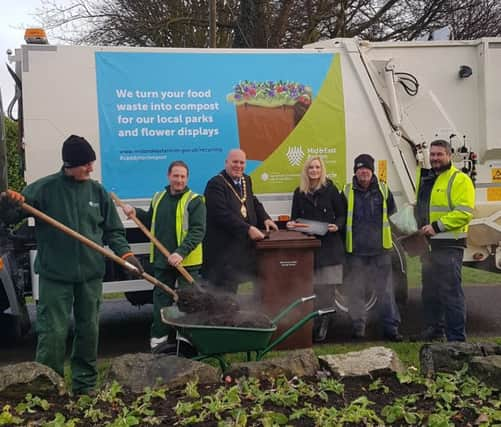Residents' food waste generates 9,000 tonnes of compost


Latest figures released by Mid and East Antrim Borough Council show that over 14,000 tonnes of biodegradable waste was diverted from landfill.
It will instead be used to nurture gardens, parks and greenways throughout the borough – saving thousands of pounds of ratepayers’ money in the process.
Advertisement
Hide AdAdvertisement
Hide AdMayor of Mid and East Antrim, Councillor Paul Reid, said: “This is an excellent response from our residents and I commend them for their overwhelming support and making the switch from black to brown bins.
“This saves ratepayers’ money and also combats environmental damage.
“It costs twice as much to dispose of food waste in a black bin as it does to recycle food waste from a brown bin.
“Unwanted food that ends up in landfill is the most polluting type of waste due to the release of harmful gases.
Advertisement
Hide AdAdvertisement
Hide Ad“Rather than pollute the environment, that waste is increasingly being put to a great use in Mid and East Antrim as high quality compost which is then made available to our residents. Brown is the New Black in our Borough and this is a complete win-win for all of us in Mid and East Antrim.”
Changes to food waste collections came into effect throughout the Borough back in April 2017, with residents urged to dispose of food waste into brown bins as opposed to black.
In 2016/17 the Council diverted 14,225 tonnes of your green waste and food waste from landfill and generated 9,200 tonnes of compost to keep Council gardens happy and healthy.
Reduced landfill costs as a result of the move are expected to deliver annual savings of £200,000 – meaning those funds are available for other projects and work.
Advertisement
Hide AdAdvertisement
Hide AdThe Council is working in partnership with Natural World Products (NWP), who provide compost for the council’s park and cemeteries which has been created from the food waste collected from residents throughout the Borough.
NWP and the Council aim that, where possible, they will prevent the waste of potentially useful materials, reduce the consumption of fresh raw materials, reduce energy usage and air and water pollution from landfilling, all by tackling the need for “conventional” waste disposal.
Colm Warren, Commercial Director at NWP, said: “NWP is delighted to work with Arc21 and Mid and East Antrim Borough Council in order to recycle residents’ food waste into compost that can then be used to help the Borough’s parks, cemeteries and greenways flourish.
“In addition to helping the Council save money, this is a great example of our local circular economy in action and illustrates the benefits of householders disposing of food waste via their brown bin or food caddy.”
Advertisement
Hide AdAdvertisement
Hide AdRemember in 2018 that you can continue to do your bit to reduce food waste by re-thinking shopping habits, creating shopping lists, planning meals and using the freezer more effectively.
Any food waste you do generate should be popped into your kitchen caddy and then dropped at the kerbside in your brown bin for collection by our crews.
For information on what can and can’t be put into your kitchen caddy and brown bin, and to read more about waste and recycling in the Council, please click onto www.midandeastantrim.gov.uk/recycling